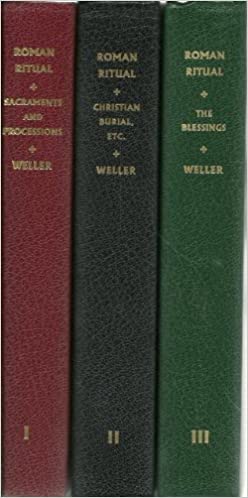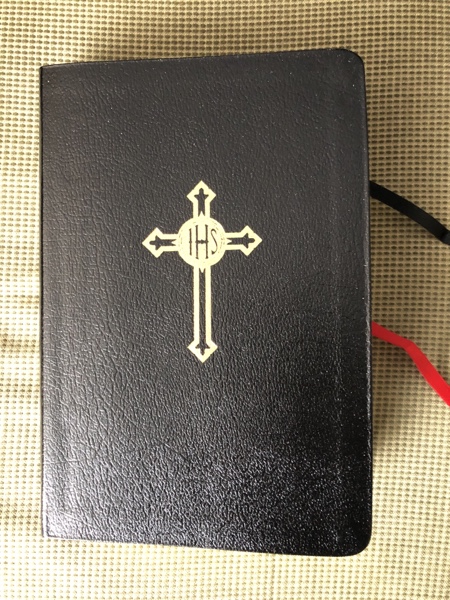IMPORTANT UPDATE:
I don’t know what I was thinking. I must have had a monsignor moment.
There is now available the great Parish Ritual which conforms to what was in force in 1962! I posted about it HERE (and there is a newer edition). This is a replacement for the old Collectio.
US HERE –
The first version had a few corrigenda, but nothing severe.
If you are looking for a CHRISTMAS GIFT for a priest… this is it.
ANOTHER UPDATE:
As per a comment, below in the combox (my emphases):
2. The Rituale Romanum, Title 8, Chapter 1 gives the general rules for blessings. These are also presented in Weller, vol. 3, pp. 2-5. Note that n. 2 states: “Both constitutive and invocative blessings are invalid if the form prescribed by the Church is not observed.” I read that to mean that a priest saying the English text out of Weller is not observing the proper form required by the Church, i.e., the Latin text, and that a blessing attempted with the English text out of Weller would be invalid. (I mean, of course, according to the laws regulating the Extraordinary Form which require doing what was in force in 1962, which was to use Latin.)
Yes, I think this is right. We know that God can do what he wants, but I know that we have to do what the Church says.
Fathers… are you trying to bless Holy Water using the ENGLISH from your volume of Weller? What you have there might be Special Water or Peculiar Water but I don’t think you have Holy Water, according to the mind of the Church.
From a priest…

QUAERITUR:
Is the Rituale Romanum, published in 3 volumes by Fr. Phillip Weller via PCP, allowed for praying the Latin prayers through Universae Ecclesiae? I am trying to get better at the EF, and would like to be able to use the prayers in these books, but I wasn’t sure whether UE allowed me to use this particular set.
The short answer is: No.
Let’s see why.
For readers in Columbia Heights… Universae Ecclesiae, the 2011 Instruction from the Pontifical Commission “Ecclesia Dei“, states that
35. The use of the Pontificale Romanum, the Rituale Romanum, as well as the Caeremoniale Episcoporum in effect in 1962, is permitted, in keeping with n. 28 of this Instruction, and always respecting n. 31 of the same Instruction.
No. 31 has to do with ordinations, so it doesn’t concern this question.
This same question comes up about the Collectio Rituum issued in 1964, which has Latin and English. I wrote about at length HERE.
In 1962, the Collectio that was in force was the 1961 edition.
The 1961 Collectio accords with the 1954 and 1959 permissions which granted limited use of the vernacular. In 1959 the Sacred Congregation for Rites permitted, in these USA at least, vernacular for sacraments excepting exorcisms, sacramental forms and blessings, and some other moments, such as prayers after funerals.
The 1964 Collectio gives wider use. The 1964, however, also says that forms of sacraments should be done in Latin.
However, we can’t use the 1964 Collectio with its wider permission for the vernacular.
“Weller”, in three volumes, is really handy, because it has English translations side by side with the Latin from the Rituale. It has been reprinted. US HERE – UK HERE
BUT… Weller’s volumes would have to be used in keeping with what was in force in 1962.
MOREOVER… Weller’s original work was done in the 1950’s and his translations are not the translations that were later approved for use.
So, Father, if we are doing a baptism in the traditional rite, there some things that we can do in English, but the exorcisms and the anointings and baptismal form must be in Latin. The “churching” of the mother is to be in Latin.
If someone comes to you with statues and medals and rosaries or a car to be blessed, you are to bless in Latin.
 The brilliant Matthew Hazell provided online a visual copy of the 1961 Excerpta e Rituali Romano, the British equivalent of the Collectio. HERE By the way, his Index Lectionum is invaluable as a preaching resource. I am grateful for his work every time I pick it up which is often. US HERE – UK HERE Anyway, the translations of the Excerpta and the Collectio would be different, but they were both approved.
The brilliant Matthew Hazell provided online a visual copy of the 1961 Excerpta e Rituali Romano, the British equivalent of the Collectio. HERE By the way, his Index Lectionum is invaluable as a preaching resource. I am grateful for his work every time I pick it up which is often. US HERE – UK HERE Anyway, the translations of the Excerpta and the Collectio would be different, but they were both approved.
Also, while the 1961 Collectio is really hard to find, the Excerpta is online and the Excerpta would indicate what must be in Latin (most everything of greater importance) and what can (not must) be in English. In the decree of the Excerpta we read “The use of English is not to be extended in any way to the recital of prayers, blessings, etc., beyond what is strictly determined in the foregoing. ”
So, no, we cannot use just the English side of Weller for blessings and most rites. It wasn’t an approved translation, and it doesn’t indicate which part must be in Latin and what can be in English in the rites.
I know that some priests may find this a little disappointing. Weller is useful for understanding the Latin… but if you want to do something in the Extraordinary Form from the Rituale Romanum STOP USING WELLER for blessings and so forth.



































Is the Latin side OK to use, or does the Latin not accord with the (Latin) texts in force in 1961?
Playing devil’s advocate, given that blessings nowadays are usually of the “wing-it” variety anyway, what’s wrong with using English translations of blessings from the Collectio? Isn’t that preferable to some stammering, wandering, or even heretical mess?
I’m not talking about Sacramental rites. That’s obviously another matter.
I wonder what the feasibility is of a new edition of Weller, edited and in conformity with the ‘59 or even expanded-64’ being approved for use. It is the *pastoral* thing to do, after all. It really wouldn’t take much work – just insert the required Latin into the English side where Latin is required and keep the translation in brackets for reference.
Father is right: the 1961 Collectio is almost impossible to find. I think I may have seen a copy, once.
Slightly easier, though by no means easy, to find is Fr. McManus’s 1962 Parish Ritual, which excerpts the 1961 Collectio. It can be scrounged off ebay with diligence. Or at least, it could when I found mine. That book has the approved vernacular for common sacraments, including baptism, along with the Latin. Preserving Christian Publications put out a new edition, but they changed many of the Scripture passages. So if there was approval for a vernacular text taken from Scripture in the 1961 Collectio, that text is wrong in the PCP edition. You are thus back to where you started. (Do any of the sacraments actually implicate this problem? I do not recall and am not in a position to check at the moment. And I have never seen the PCP edition in person.)
As for Fr. Weller’s Latin: I recall having looked at this once, with respect to Baptism only. My recollection is that there are no differences in the Latin text for the Rite of Baptism for Children between (a) Fr. Weller’s volume and (b) Fr. McManus’s volume. I cannot speak to revisions that might have been made elsewhere. Caveat lector.
[NB my update at the top! The Parish Ritual has been republished! It conforms to the 1962 usage.]
Would using the English translation to bless Holy Water, for example, be illicit but still valid? That is would the water still be Holy Water, or would nothing happen? I asked because I had asked a priest to use the Rituale Romanum, but he used Weller’s translation instead of Latin.
[It certainly would be illicit. Ineffective? I don’t know. But there is no reason to take the risk. Just use Latin. And “I don’t know Latin!”, is not really a good excuse for priests of the LATIN RITE.]
Also father I believe the original question was asking if Weller could be used in Latin. He doesn’t mention saying the prayers in English.
[There’s nothing wrong with Latin. That is obvious.]
Thanks Father! i am in a Secret Santa to get a gift for a cleric and this looks to fit the bill perfectly for the bit that i know about the man in question.
I’d like to mention a few points which hopefully contribute to the discussion.
1. The laws regarding the validity and liceity of sacraments are different from those regarding the validity and liceity of sacramentals such as blessings. Be careful to realize that “illicit but valid” does not work the same way for blessings as it does for sacraments.
2. The Rituale Romanum, Title 8, Chapter 1 gives the general rules for blessings. These are also presented in Weller, vol. 3, pp. 2-5. Note that n. 2 states: “Both constitutive and invocative blessings are invalid if the form prescribed by the Church is not observed.” I read that to mean that a priest saying the English text out of Weller is not observing the proper form required by the Church, i.e., the Latin text, and that a blessing attempted with the English text out of Weller would be invalid. (I mean, of course, according to the laws regulating the Extraordinary Form which require doing what was in force in 1962, which was to use Latin.) I admit that seems a bit weird in the current situation in the Church, with vernacular allowed for almost anything, and priests making up ad lib blessings. My instinct would be to doubt the validity of blessings given by made up formulas without using an offical text, but that’s a complicated question.
3. As far as I know, the Latin texts in Weller should be fine for use. It’s just the English translations that are not approved.
4. The changes to scriptural texts in the Parish Ritual republished by PCP involve replacing the Pius XII psalms with the traditional Vulgate (Gallican) psalms, and replacing scriptural translations from the Confraternity version with translations from the Douay-Rheims (Challoner) version. Since the Pius XII psalms were an option but not mandatory, I don’t see any problem in reverting to the more traditional texts with more traditional translations.
5. I’d encourage priests to take note of the general rules for blessings. I’ve seen many priests attempting to do blessings using the EF, but not knowing how to start the ceremony, or wearing a biretta while blessing, or otherwise stumbling over things that are clarified in the general rules. Reading the general rubrics is a good idea.
I am most amused that the late Monsignor Frederick McManus’ Parish Ritual is back in print. The late Monsignor Frederick R. McManus was a canonist who played a not inconsequential role in the drafting of what we now know as the Ordinary Form of the Mass or the Novus Ordo. He might be horrified to know that the older liturgical books are in much more widespread use again.
He was one of the founders of ICEL and one of the editors of Worship, a journal published by Liturgical Press which promotes the hermeneutic of rupture in the liturgy. He also taught canon law for decades at the Catholic University of America.
I wonder if anyone has noticed strange noises coming from his grave in Lynn, Massachusetts.